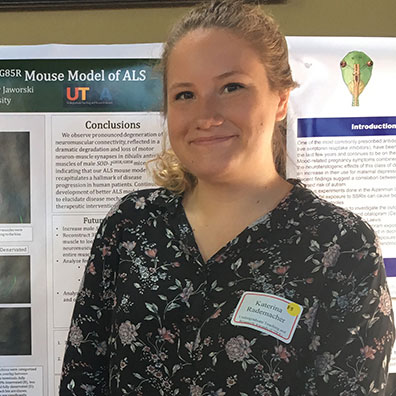Project Title: Neuromuscular Loss of Innervation and Mouse Models of ALS. (Advisor: Alexander Jaworski; Neuroscience)
What is your major/concentration?
Neuroscience.
What year will you graduate?
2019.
Where are you from?
Longmont, Colorado.
What were your academic interests in high school?
In high school I was very STEM oriented, but also took literary arts classes. I actually began to take an interest in neuroscience because my high school biology classes covered it so little.
What is your favorite activity outside of the classroom?
Outside of the classroom, I'm a violinist and violist, and have spent a significant amount of time at Brown with the university orchestra, the applied music program, and the chamber music program.
Why did you decide to pursue research in brain science?
I pursued research in brain science because I know that the field is incredibly broad and expanding quickly. I pursued brain science because I was looking for research that was innovative and pioneering.
Can you tell us a little about your project and what you found?
The goal of my project was to characterize a new, more accurate mouse model for ALS. Current models rely on transgenic mice, which don't express genes of interest at normal biological level. We characterized a knock-in mouse, which has normal gene expression levels and patterns. I characterized the model by measuring the loss of innervation of neuromuscular junctions in the muscles of the mice. I found that the muscles of our model mice are significantly dennervated, indicating that it may be a viable new model for ALS. Continued development of better ALS models will help reveal disease mechanisms and possible new therapeutic targets.
What is your most memorable experience from your training in brain science?
My most memorable experience was when I finished analyzing my full data set, and confirmed that my data was statistically significant. In the moment that I got those results, I felt that all my hard work over the summer had really paid off, and knew that there are many future directions that I will follow up on in this coming year.
What have you learned from this experience that you are applying to other aspects of your Brown degree?
I learned that what I get out of research depends on how much time and energy I'm willing to put in, which is true of anything that I do, whether that be research, classes, or music. I learned how to keep myself motivated to push forward, even when things went horribly wrong or when results were unexpected.
What would you like to do after graduating?
After graduating, I'm interested in going to graduate school to continue doing research in neuroscience.
